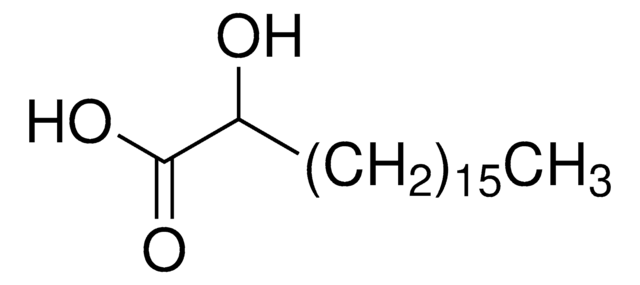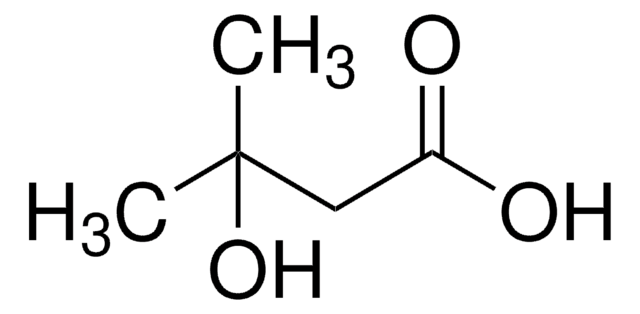H4398
DL-β-Hydroxypalmitic acid
≥98%
Synonym(s):
3-Hydroxyhexadecanoic acid
Sign Into View Organizational & Contract Pricing
All Photos(1)
About This Item
Empirical Formula (Hill Notation):
C16H32O3
CAS Number:
Molecular Weight:
272.42
MDL number:
UNSPSC Code:
12352211
PubChem Substance ID:
NACRES:
NA.25
Recommended Products
Quality Level
Assay
≥98%
form
powder
functional group
carboxylic acid
lipid type
saturated FAs
shipped in
ambient
storage temp.
2-8°C
SMILES string
CCCCCCCCCCCCCC(O)CC(O)=O
InChI
1S/C16H32O3/c1-2-3-4-5-6-7-8-9-10-11-12-13-15(17)14-16(18)19/h15,17H,2-14H2,1H3,(H,18,19)
InChI key
CBWALJHXHCJYTE-UHFFFAOYSA-N
Biochem/physiol Actions
DL-β-Hydroxypalmitic acid is a mixture of D- and L-β-hydroxypalmitic (3-hydroxyhexadecanoic) acids. 3-hydroxyhexadecanoic [C16:0(3-OH)] may be used in studies that involve the lipid structures of endotoxin lipid A molecules.
Storage Class Code
11 - Combustible Solids
WGK
WGK 3
Flash Point(F)
Not applicable
Flash Point(C)
Not applicable
Personal Protective Equipment
dust mask type N95 (US), Eyeshields, Gloves
Certificates of Analysis (COA)
Search for Certificates of Analysis (COA) by entering the products Lot/Batch Number. Lot and Batch Numbers can be found on a product’s label following the words ‘Lot’ or ‘Batch’.
Already Own This Product?
Find documentation for the products that you have recently purchased in the Document Library.
Customers Also Viewed
A Fjellbirkeland et al.
Archives of microbiology, 168(2), 128-135 (1997-08-01)
Membranes obtained from whole-cell lysates of Methylococcus capsulatus (Bath) were separated by Triton X-100 extraction. The resulting insoluble fraction was enriched in outer membranes as assessed by electron microscopy and by the content of beta-hydroxy palmitic acid and particulate methane
A B Flavier et al.
Molecular microbiology, 26(2), 251-259 (1998-02-12)
Expression of virulence genes in Ralstonia solanacearum, a phytopathogenic bacterium, is controlled by a complex regulatory network that integrates multiple signal inputs. Production of several virulence determinants is coordinately reduced by inactivation of phcB, but is restored by growth in
M Shinohara et al.
Journal of applied microbiology, 103(1), 152-162 (2007-06-23)
To screen novel micro-organisms and enzymes capable of degrading 3-hydroxypalmitic acid methyl ester (3-OH PAME), the quorum-sensing signal molecule (quormone), which regulates the virulence of Ralstonia solanacearum. Ideonella sp. 0-0013, a betaproteobacterium isolated from soil using the selective-enrichment culture method
Paul J Brett et al.
Molecular microbiology, 63(2), 379-390 (2006-12-14)
Burkholderia mallei, the aetiologic agent of glanders, causes a variety of illnesses in animals and humans ranging from occult infections to acute fulminating septicaemias. To better understand the role of lipopolysaccharide (LPS) in the pathogenesis of these diseases, studies were
R P Garg et al.
Molecular microbiology, 38(2), 359-367 (2000-11-09)
In the phytopathogen Ralstonia (Pseudomonas) solanacearum, control of many virulence genes is partly mediated by the Phc cell density sensing system. Phc uses a novel self-produced signal molecule [3-hydroxypalmitic acid methyl ester (3-OH PAME)], an atypical two-component system (PhcS/PhcR), and
Our team of scientists has experience in all areas of research including Life Science, Material Science, Chemical Synthesis, Chromatography, Analytical and many others.
Contact Technical Service
















